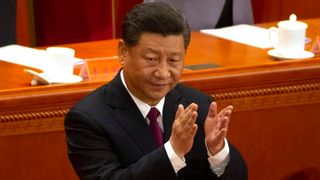Six weeks after the federal election, either Scott Morrison or Bill Shorten will fly to Japan to attend the G20 summit in Osaka. In the weeks we were preoccupied with campaigning, the world did not become a more benign place. At a time when China is barely bothering to conceal its revisionist intentions and the United States has finally had enough, these three mindsets will help frame priorities and advance our national interests.
First, reject the enticement of any bilateral "reset" that is offered or imagined, especially with countries with whom we continue to have significant disagreements.
This applies most to China with whom Australia has endured a rough diplomatic period since late 2017. Chinese President Xi Jinping, who is likely to attend, will almost certainly offer our next leader a diplomatic reset – but only if Canberra will reconsider and even walk back some policies including the banning of Huawei from the 5G roll-out, reluctance to sign-on to the Belt and Road, countering Chinese actions in the South China Sea and South Pacific, and legislation to strengthen our institutions against mainly Chinese interference and covert influence.
In exchange for diplomatic warming, China will also relentlessly argue for a re-evaluation of the emphasis we place on various countries sharing our concerns. Top of its list is Japan, which is the most important and powerful American ally in the Indo-Pacific.
Earlier this decade, Beijing believed Tokyo had been largely neutralised and was retreating. That expectation was premature. Under Shinzo Abe, Japan gradually emerged as the most significant Asian strategic player and champion of democratic principles and institutions in the region. It was Japan that largely picked up the pieces when Donald Trump abruptly withdrew from the Trans-Pacific Partnership. Tokyo’s willingness to modernise its military, lend its still considerable weight towards a more "proactive contribution to peace", and advance significant strategic partnerships with countries such as India, Vietnam and the Philippines have greatly complicated matters for Beijing.
Creating headaches is important because a still internally fragile China was nevertheless emboldened by the weak resistance against it.
This burgeoning strategic relationship between Australia and Japan – perhaps the most important foreign policy legacy left by the Abbott and Turnbull governments – creates real headaches for China because it allows the US-Japan-Australia trilateral arrangement to become much more meaningful.
Creating headaches is important because a still internally fragile China was nevertheless emboldened by the weak resistance against it when Beijing first openly ignored many of the rules, norms and laws in the region such as in the South China Sea earlier this century. The greatest chance of peace and stability we have is to dissuade China from pushing the envelope and a formidable balance against it is the best way of achieving that. Australia is a canary in the coalmine in this context. Our prime minister needs to reassure others that is still the game plan. He must also make it clear from the beginning that though we desire a constructive relationship with China, we are not for turning.
Indeed, former prime minister Paul Keating offered a uniquely absurd suggestion that serves as an extreme paradigm of what not to do when he urged Shorten to sack the country’s intelligence chiefs should the Labor leader win office. Implementing Keating’s advice would increase expectations in Beijing that expressions of displeasure can be used to acquire a significant and even decisive say in the defining of Australia’s national interests and even appointment of senior national security officials.
Regional engagement
Second, the next government – especially if it is a Labor-led one, which has not been in power since Trump won office – must resist buying into unhelpful caricatures of the President and his administration. Doing that is the sure way to national self-harm or else irrelevance. Instead, the next government should realise that there are significant risks and costs to persevering with settled approaches just as there are with adopting maverick ones. Indeed, the downside of "business as usual" may well become prohibitive over time.
Consider the American-initiated economic offensive against China, which is unlikely to have occurred to the extent it has if it were any other candidate in the White House. The US, European Union, Japan and other major economies have lamented for years China's increasing gaming of loopholes in rules such as those established by the World Trade Organisation to the extent that the global economic system could eventually breakdown. These include China’s illegitimate use of subsidies, behind-the-border barriers, forced intellectual property transfers and theft, and economic coercion to unfairly advantage its preferred firms and advance strategic and political objectives.
Bear in mind escalation and disruption are indispensable elements of the strategic toolkit.
The common wisdom was that nothing could change China’s calculation. It remains to be seen whether China can be compelled to better respect the spirit and letter of global economic rules and any signing of a trade deal next month are just the first steps of a difficult negotiation. Trump’s threat yesterday to slap tariffs on almost $290 billion worth of Chinese exports to America and walk away from the latest round of negotiations is the latest attempt to compel Beijing to change its predatory behaviours. In any event, Trump’s administration is the first to put China on the back foot and cause the latter to fundamentally recalculate the pros and cons of its economic policies.
Bear in mind escalation and disruption are indispensable elements of the strategic toolkit – note Trump forcing European NATO members to take more seriously their longstanding promise to spend more on defence. The next government should make the best of the current administration rather than wring its hands in the face of the unconventional. For example, Canberra should join with the EU and Japan to help improve the tactics and refine the objectives of Washington’s economic offensive that will strengthen and improve the international system rather than recoil at the thought of disturbance as is presently the case.
Finally, we need to do what we can to enhance the regional relevance and role of India and Indonesia – both G20 members – even if their objectives do not always align neatly with that of Australia’s. They are populous, democratic, developing countries supporting the key principles of what we term the "Free and Open Indo-Pacific". Their size and geography mean they are leaders in south and south-east Asia respectively.
This leads to a parting thought. While Australia’s immediate neighbourhood is relatively benign, we should welcome a rich system of checks and balances throughout the Indo-Pacific. A crowded regional chessboard of status quo nations makes mischief by revisionist states that much more difficult.




.jpg?rect=0,80,3000,1989&fp-x=0.5&fp-y=0.44772296905517583&w=320&h=212&fit=crop&crop=focalpoint&auto=format)

